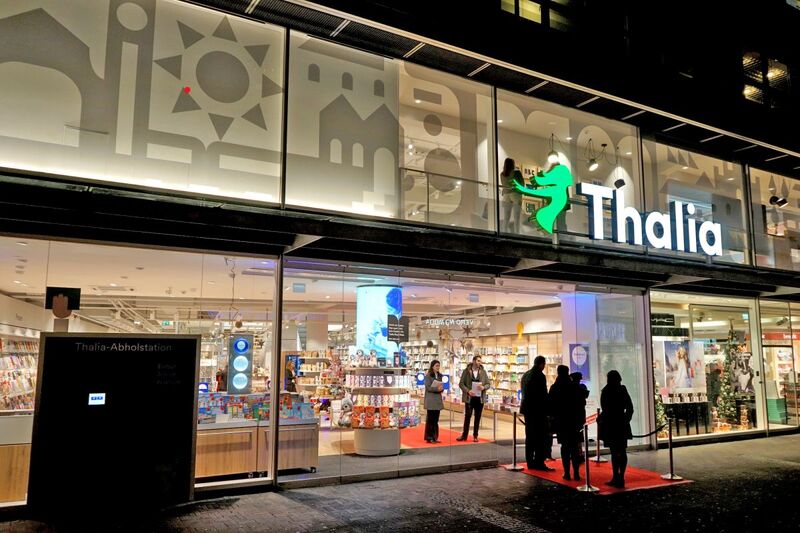You are viewing your 1 free article this month. Login to read more articles.
Libreria opening marks trend in designer bookshops
Design-led bookshops are revitalising high-street bookselling, according to those behind the movement.
Libreria, based in London’s East End and the brainchild of the founders of creative workspace/private members club Second Home, business partners Rohan Silva and Sam Aldenton, opens this week (25th February) with the intention of being a “refuge” from digital.
The pair revealed in November that they intended to open an 830 sq ft bookshop in Hanbury Street as their next venture. Since then the industry has been awaiting the unveiling of the new store with excitement and anticipation. Silva received hundreds of job applications to work in a bookshop that he promised would be both “experiential” and designed to attract Millennials.
The creation does not disappoint. While the venue looks like a traditional bookshop from the outside, with a classic black frontage and white lettering and an expansive bay window to display titles, the interior is something quite different.
Floor to ceiling shelves, handcrafted by two artists from the Slade School of Fine Art, wind around the walls and emanate a warm, orange glow due to several lights and lamps—all different in style—which spring out from between 6,000 titles. Inspired by Jorge Luis Borges’ short story “The Library of Babel” and designed by SelgasCano, the same Spanish company that created Second Home, the bookshop has a ceiling covered in an unusual black reflective material called barrisol, along with a mirror at the far end, giving the illusion of extra space. Large grooves cut into the walls are filled with comfortable cushions, inviting customers to sit down and read, while wooden display units on the floor can be wheeled away and replaced with chairs for events—which the bookshop intends to hold “nearly every night”. A packed, bustling live events programme is central to the venue’s ethos of being a creative hub and attracting new people to books, and to this end it intends to open for 24 hours a day at least once a month, “playing to the insomniac crowd”.
“We are intending to make it as dynamic an events schedule as we can,” said Sally Davies, the former digital editor of the FT Weekend, who has been hired as Libreria’s director. “We want it to be a destination—like a reinvention of a [Parisian literary] Salon. We want to attract people who do not necessarily see themselves as bookshop people and holding events is the perfect way to do that.”
Helping to conjure a varied bookshop experience, the shop has a whisky bar—free to sup for customers because the venue doesn’t have a licence—and a printing press in the basement, run by designer, printer and bookseller Jessica Fogarty, to really bring books “to life”. The press may one day publish its own titles. In an unusual twist, the books in the shop are displayed by broad, quirky themes and across genres, under which can be found both fiction and non-fiction titles. For example, “Wonderlust” features books by authors ranging from Robert Macfarlane to Marco Polo, encouraging a spirit of serendipity in discovering new and inspiring works. The shop has been careful to try and stock “the widest range possible” of new and backlist titles, according to Davies, which has led to her, Fogarty and bookseller Paddy Butler—formerly of Daunt Books— meeting with publishers and “pulling 3 a.m. mornings, huddled together poring over inventories”. The outlet also intends to stock a small range of signed and first editions.
Bookshop founder Silva, who was once described as the “wildest thinker in David Cameron’s Downing Street policy unit” by the Financial Times, has even loftier ambitions for the space and what it represents. “The bookshop is a response to the digital age we live in,” he said. “It is celebrating the analogue”.
To that end, digital devices such as smartphones and tablets are banned inside the shop, yet the move is not an attempt to counter showrooming, whereby people discover products in shops and then buy them online.
Silva explained: “The whole idea is to help people break out of their silos and do what Amazon can’t do, to really create a sense of serendipity. We get stuck in these crappy algorithms, these really narrow forms and I don’t think they are good for our wellbeing, for society. If we are about community, helping people learn is about exposing people to new ideas they might come across. Technology is great, but social media can be like an echo chamber of people with like-minded views. We are trying to expose people to things and ideas they might not know about.”
He added: “I say this as someone who spends all my time on my phone. I know that is not good for me. Clearly the community we have at Second Home are technology enthusiasts and some of the most creative people in the East End and we love it, but too much of it is a problem. People will see this place as a kind of refuge. A place where you can lose yourself in information and stories without being distracted by the internet.”
Silva is concerned with the response to the digital age and what society might have lost from digital advancement. “We are at a moment in time where technology is advancing and lots of jobs are being replaced by machines,” Silva said. “What is left for us humans is creativity. How do you really nurture creativity? Through the cross-pollination of ideas. A physical bookshop is one of the environments where that happens best, in one of the most organic ways,” he added.
Greater investment in the design of bookshops, in order for them to become “destinations”, is becoming a marked trend in the industry— especially in the capital—as booksellers seek to differentiate themselves and fight back against competition from online retailers.
Just before Christmas, Waterstones opened a new three-storey premises on Tottenham Court Road, containing a bar and a cinema, with a “retro” appeal playing to the nearby Soho and British Film Institute (BFI) crowd and featuring exposed industrial concrete in the basement.
In October, Egyptian bookshop chain Alef Bookstores opened its first international branch in London’s Baker Street, evoking an “exotic, Middle Eastern vibe,” according to manager Farah Taylor, while Foyles moved and ambitiously redesigned its flagship store on Charing Cross Road in June 2014, winning a design award for its efforts.
Outside of London, Manchester independent Chapter One Books, located in the city’s Northern Quarter, opened last summer, recreating an Alice in Wonderland-style woodland theme inside. Further afield, South Africa’s Exclusive Books relaunched its Hyde Park Corner, Johannesburg bookshop at the beginning of this year, throwing off “the shackles and restraints of the chain store mentality” with an extravagant revamp that features a Michelin-starred Social Kitchen & Bar and a panoramic view of the city, along with a bohemian interior design throughout.
It appears that such visions are paying off. Exclusive Books’ sales are up 30% since its relaunch; Waterstones is seeing a marked increase in sales through the stores it has revamped and better-than-expected sales in its new stores; while Foyles has seen volume sales increase by between 6%–7% since moving from its previous flagship location.
Rik McShane, retail director at Waterstones, said: “We put an enormous amount of time into how the shops are going to look . . . Gone are the days where we can’t make the space as beautiful and effective as the books that are in them.”
He added: “If we want to win back our customers, retain our existing ones and win over new customers, we have got to invest in creating an environment people want to come into, as that is what defines us.”
Sion Hamilton, retail operations director for Foyles, said: “A bookshop can be a bewildering experience and it is our job as booksellers to make the experience as comfortable as possible. In the book industry, we tend to talk to people about the content of books, we think about that a lot, but we don’t think about how customers get to the books, which is just as important.”
Intriguingly, Exclusive Books has also banned the use of technology such as laptops and tablets in its revamped shop, and James Daunt, m.d. of Waterstones, recently said that using technology in store to market books would “detract” from a bookseller’s skill, asking: “What next, holographic booksellers?”
However, not all bookshops think that excluding technology is the answer to creating vibrant, beautiful bookshops. Foyles has been incorporating digital aspects into its new stores, such as digital display screens showcasing books and “author pods”, which enable customers to listen to audiobooks. Both feature in its new Birmingham Grand Central Station branch. Hamilton said: “We all carry digital devices in our pockets. What we are trying to do is think, ‘What are all the ways we can bring an exciting retail experience to you?’, and the screens [in store] are working. They are engaging for some people . . . maybe not all, but we know they are working for some.”
He added: “Customer service is as important as the design of the shop. If we have got passionate and friendly staff, that can also transform a space. We are not just competing with online booksellers, but all the other companies on the high street too.”
Justin Small, chief strategy officer of the Bio Agency, which helps companies create better in-store experiences by connecting the physical to digital, said that "the high street is back".
"Shops have got to sell brand experiences, as it is these physical high street experiences that will be the key to driving online sales.', he told The Bookseller. “Amazon has realised it needs to compete not just on price or delivery, but on shopping experience. Browsing is not something the internet does very well, and because at its most basic level shopping is leisure, the high street retailer has a competitive advantage over the online only retailer here. Five years ago everyone was worried the high street was going to close, but now everyone from Travel Agents, to Estate Agents, to Burberry to Boots are investing in their physical retail experience. Physical still has a long way to go in integrating digital and developing self serve, but this renaissance of the high street feels like a trend that could gather pace.”
Libreria opens on 25th February



















